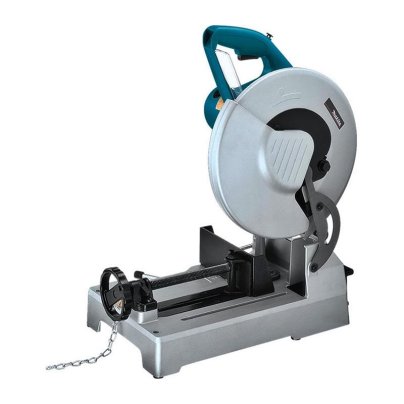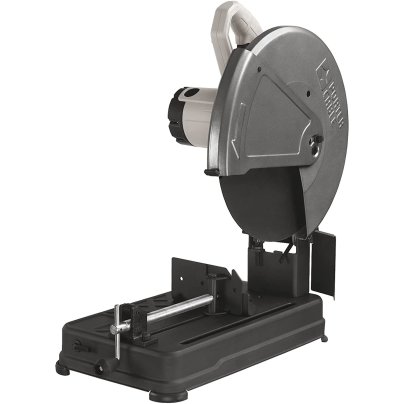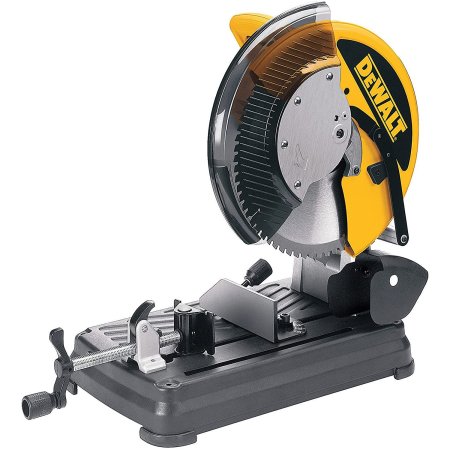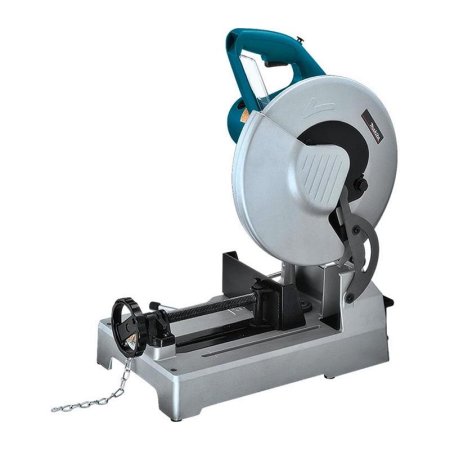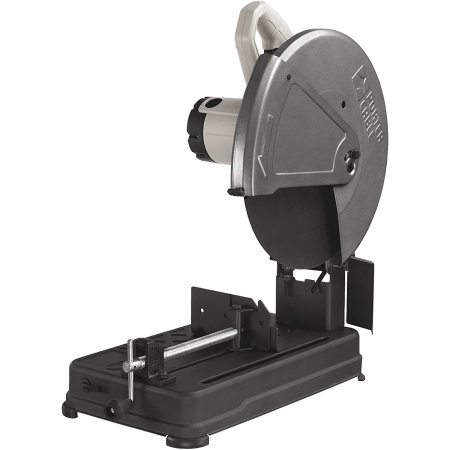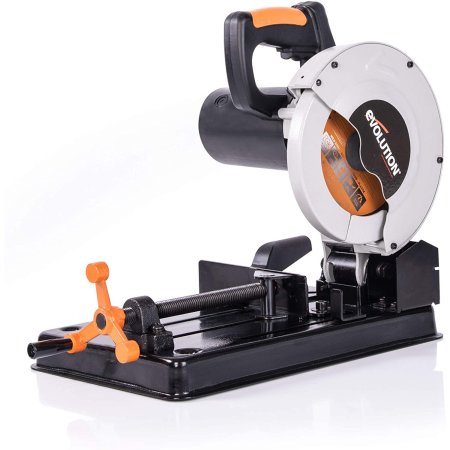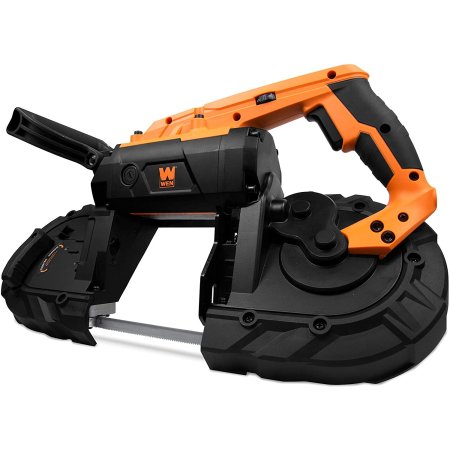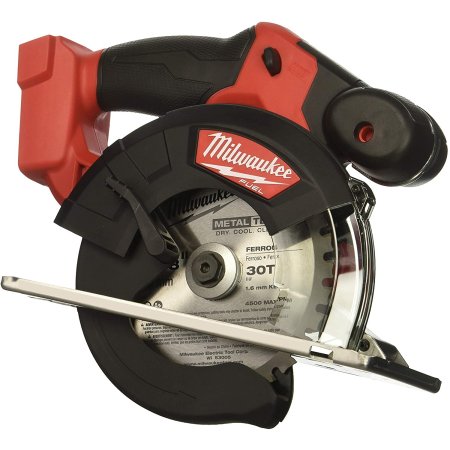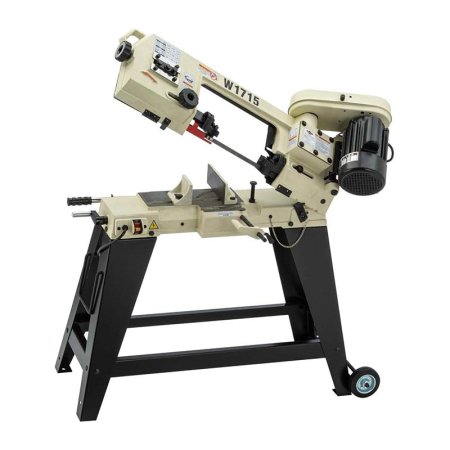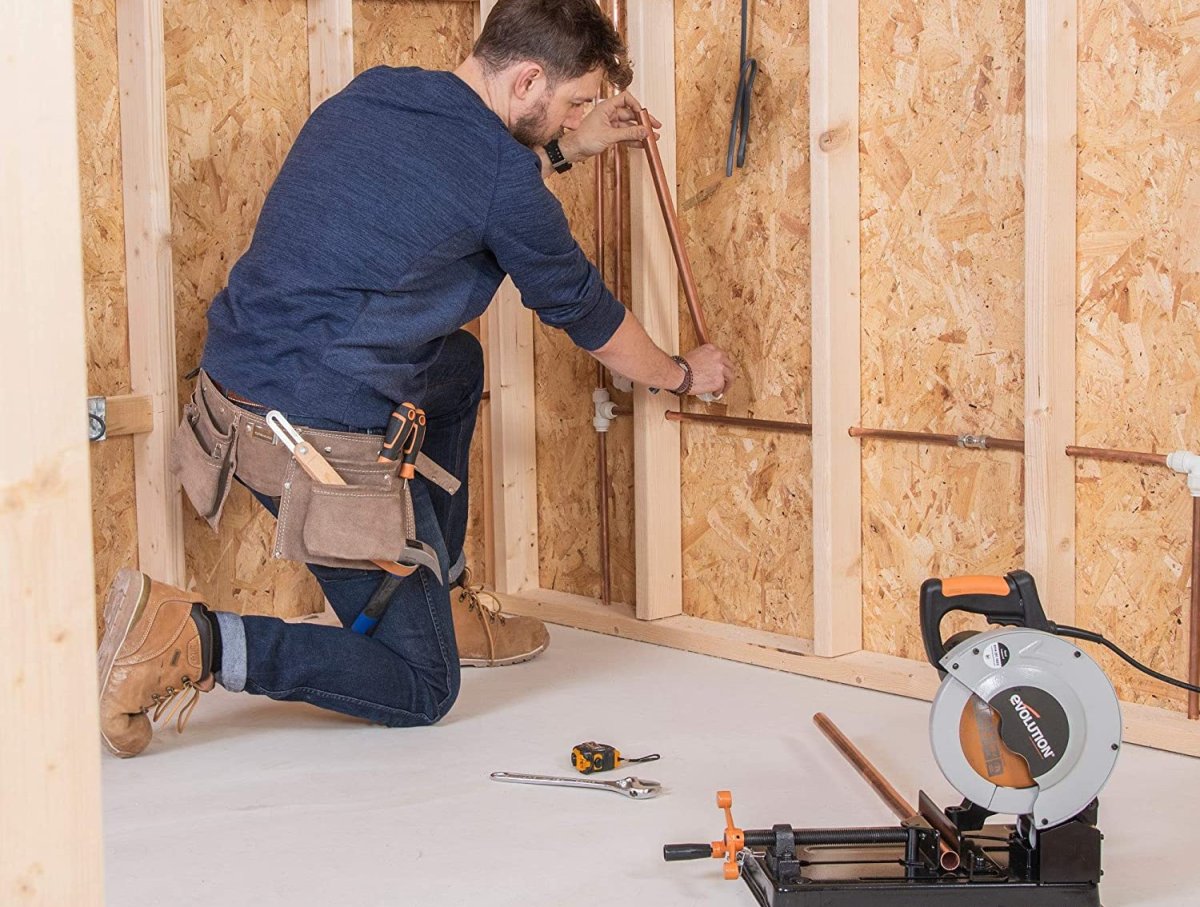
We may earn revenue from the products available on this page and participate in affiliate programs. Learn More ›
It’s an understatement to say that sawing through metal by hand is hard work, but there’s no need to break a sweat when today’s powered metal-cutting saws make quick work of the task. Sure, a hacksaw can tackle occasional small jobs, but for larger pieces, or if you cut metal on a regular basis, a power tool is a more sensible solution.
However, the wide variety of metal-cutting chop saws, band saws, and circular saws on the market makes it challenging to find the right tool. We evaluated some of the top options and rounded up those that we feel stand out from the rest of the bunch, such as our favorite: DeWalt’s DW872, a versatile workhorse that’s priced fairly and built to last. It also has the best 14-inch carbide metal-cutting blade for general-purpose use we found. But we also liked other metal-cutting saws for other reasons, such as the Wen 94396, which we’ve tested first-hand in the past. In this guide, we’ll help clarify the options available, discuss the key technical features of each type, and offer our suggestions for the best metal-cutting saws on the market.
- BEST OVERALL: DeWalt DW872 14″ Multi-Cutter Saw
↓ Jump to Review - RUNNER-UP: Makita LC1230 12″ Metal Cutting Saw
↓ Jump to Review - BEST BANG FOR THE BUCK: Porter-Cable PCE700 14″ Chop Saw
↓ Jump to Review - BEST DIY: Evolution RAGE4 Multi-Material Cutting Chop Saw
↓ Jump to Review - BEST PORTABLE: Wen 94396 5” Handheld Portable Band Saw for Metal
↓ Jump to Review - BEST CIRCULAR: Milwaukee M18 Fuel Metal Cutting Circular Saw
↓ Jump to Review - BEST HEAVY-DUTY: Shop Fox W1715 ¾ HP Metal Cutting Bandsaw
↓ Jump to Review
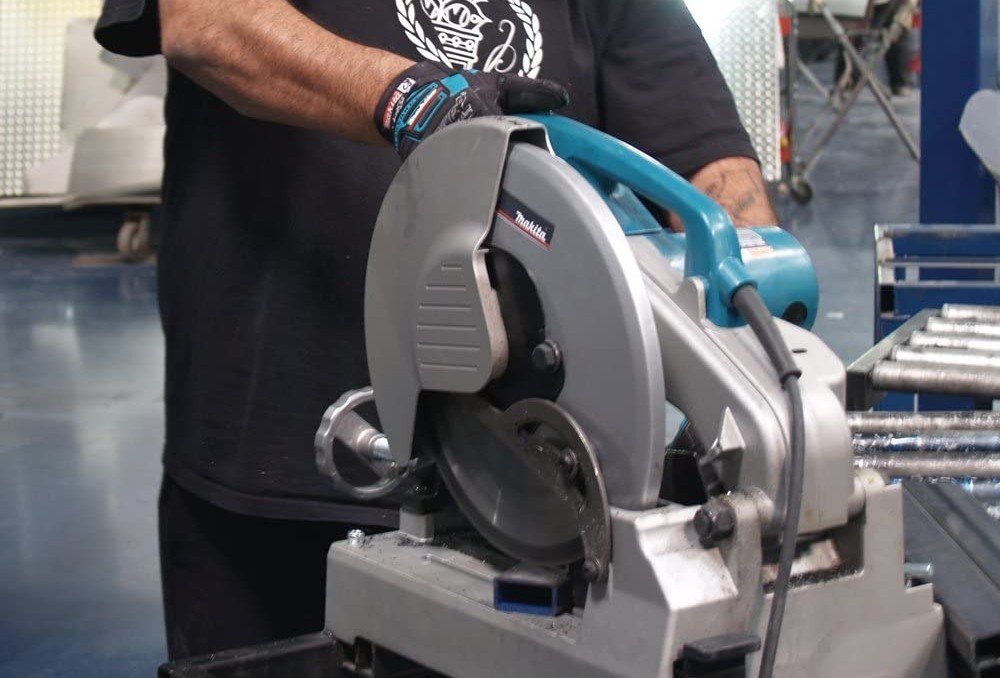
Metal Cutting Saw Comparison Chart
| Product Name | Power | Speed | Weight |
| DeWalt DW872 | 15 amps (corded) | 1,300 RPM | 50.7 pounds |
| Makita LC1230 | 15 amps (corded) | 1,700 RPM | 42.5 pounds |
| Porter-Cable PCE7014″ | 15 amps (corded) | 3,800 RPM | 32 pounds |
| Evolution RAGE4 | 10 amps (corded) | 4,200 RPM | 20.1 pounds |
| Wen 94396 | 10 amps (corded); 20-volt cordless also available | Variable: 60 to 420 FPM | 14.5 pounds |
| Milwaukee M18 | 18-volt cordless | 3,900 RPM | 5.9 pounds |
| Shop Fox W1715 | ¾ horsepower, single phase (uses standard 110-volt outlet) | 78, 108, or 180 FPM | 139 pounds |
Our Top Picks
Now that you’ve learned about the differences in the types of metal-cutting tools and their features, it’s time to check out some of the best models on the market.
Best Overall
DeWalt DW872 14" Multi-Cutter Saw
What We Like
- Renowned DeWalt quality
- 70-tooth carbide-tipped blade
- Minimal heat buildup
What We Don’t Like
- Premium price
- No chip collection
Specs
- Power: 15 amps (corded)
- Speed: 1,300 RPM
- Weight: 50.7 pounds
The DeWalt DW872 is a frequent favorite in independent reviews of the best chop saw for metal. The powerful 15A (amp) motor combines with a 70-tooth carbide-tipped blade to provide fast, clean cutting of steel, aluminum, copper, and other metals, as well as plastics, composites, and wood.
The DW872 has a class-leading cutting capacity of up to 5-3/16-inch diameter in solid bar or 6½ inches by 4½ inches in rectangular stock. Users can create bevels of up to 45 degrees using the adjustable fence, and the clamp has a quick-release lever.
At just over 50 pounds, the chop saw is fairly portable while also being sturdy, though the pressed-steel base isn’t quite as rigid as some cast versions. The blade guard is plastic. There is neither a chip tray nor a spark deflector, but since the DeWalt produces very few sparks, this isn’t really an issue.
Get the DeWalt metal-cutting saw at Amazon, The Home Depot, or Acme Tools.
Runner-up
Makita LC1230 12" Metal Cutting Saw
What We Like
- Rigid, durable build
- 60-tooth carbide-tipped blade
- Safety goggles included
What We Don’t Like
- Ineffective chip tray
- Expensive for DIY users
Specs
- Power: 15 amps (corded)
- Speed: 1,300 RPM
- Weight: 50.7 pounds
Another popular, high-performance choice, this Makita model offers proven durability, competitive performance, and rapid adjustment. It has a blade slightly smaller than the DeWalt, with a maximum cut of 4½ inches. However, the 60 carbide-tipped teeth provide fast cutting and a smooth finish through a wide variety of metals. The base is a solid aluminum casting, and the blade guard is steel, although it produces very few sparks.
While several chop saws have a quick-release clamp for fast, repetitive cutting, the Makita also boasts a quick-release fence for rapid setting of different angles. Quick-and-easy blade changing requires a socket wrench, but it’s included. A pair of safety goggles also comes with the saw. Although a chip tray is provided, it catches very little. The Makita chop saw makes a useful light- to medium-duty tool, but for DIY users, it’s a significant investment.
Get the Makita metal-cutting saw at Amazon, The Home Depot, or Acme Tools.
Best Bang for the Buck
Porter-Cable PCE700 14" Chop Saw
What We Like
- Sturdy, reliable build
- Comparatively lightweight
- Great cost value
What We Don’t Like
- Abrasive wheel could be better
- Lacks precision
Specs
- Power: 15 amps (corded)
- Speed: 3,800 RPM
- Weight: 32 pounds
At first glance, it was difficult for us to understand why the Porter-Cable chop saw is so affordable. Its overall construction is sturdy, and it has a powerful 15A motor. It features an adjustable fence for cutting angles at up to 45 degrees and a quick-release clamp. The spark deflector protects the user and provides a clear view of the cut line.
The big difference in this chop saw is its abrasive wheel. While it runs at 3,800 RPM (revolutions per minute), the actual cutting speed is considerably slower than with a toothed blade. Additionally, while replacement wheels are a fraction of the cost of a tungsten carbide blade, they wear out much more quickly. So while the maximum cut is stated at 5 inches, it quickly reduces with regular use. Abrasive wheels also produce a lot of sparks. Still, we think this chop saw’s humble price makes it a worthy option for home welders and engineers who don’t need high precision.
Get the Porter-Cable metal-cutting saw at Amazon, The Home Depot, or Acme Tools.
Best DIY
Evolution RAGE4 Multi-Material Cutting Chop Saw
What We Like
- Very versatile blade
- Light and portable
- Relatively inexpensive considering its quality
What We Don’t Like
- Light-duty only
- Modest capacity
Specs
- Power: 10 amps (corded)
- Speed: 4,200 RPM
- Weight: 20.1 pounds
DIYers in the market for a multipurpose saw may wish to check out the Evolution RAGE4. Lightweight and affordable, it’s a well-made, sturdy tool with an adjustable fence and quick-release clamp. The 10A motor isn’t as powerful as some, but it’s a good match for the 7¼-inch tungsten-tipped blade.
Thanks to its remarkable versatility, the blade is the star here. It can make accurate cuts in ferrous and nonferrous metals, plastic, PVC, composites, and wood. The maximum thickness in steel plate is only ¼ inch, but it can saw through a box section up to 5 inches across.
The saw generates very little heat and few sparks. Weighing just 20.1 pounds, it’s highly portable and easy to store, making it a good choice for a small workshop with limited space.
Get the Evolution RAGE4 metal-cutting saw at Amazon, The Home Depot, or Tractor Supply Co.
Best Portable
Wen 94396 5” Handheld Portable Band Saw for Metal
What We Like
- Variable speed function
- Very maneuverable
- Useful stand included
What We Don’t Like
- A lot of plastic
- May suffer occasional breakdowns
Specs
- Power: 10 amps (corded); 20-volt cordless also available
- Speed: 60 to 420 feet per minute (FPM)
- Weight: 14.5 pounds
Wen has a reputation for producing durable tools at competitive prices, and we think this handheld portable band saw is a good example. It boasts a reliable 10A motor that drives a 10/14-TPI variable pitch blade suitable for a variety of materials. Users can adjust the speed, so the feed rate can be optimized for metals ranging from aluminum to cast iron. It can complete a maximum cut of 5 inches.
The ball-bearing guides help ensure smooth cutting, and an external lever simplifies blade tensioning. A rubberized grip offers room for a gloved hand, and an auxiliary handle at the front provides a sure hold.
At under 15 pounds, it’s light, but that’s because it contains quite a lot of plastic. Although the saw isn’t fragile, it might suffer damage in tough jobsite environments. Reports also exist of occasional breakdowns, though these seem to be isolated incidents rather than a common problem.
What our tester says: Glenda Taylor, a Bob Vila staff writer and product tester, notes in the Best Portable Band Saws that she “tested the Wen by cutting angle iron, steel, PVC, and conduit. It sliced through all of them like butter. With a cutting capacity of 5 inches by 5 inches, this is a deep-throat band saw that will cut through sizable items, and because it’s corded, it won’t lose power as long as an outlet is nearby.”
Get the Wen metal-cutting saw at Amazon, The Home Depot, or Walmart.
Best Circular
Milwaukee M18 Fuel Metal Cutting Circular Saw
What We Like
- Efficient brushless motor
- Very light and compact
- Good battery life
What We Don’t Like
- Battery and charger are extra
- Pricier than most
Specs
- Power: 18-volt cordless
- Speed: 3,900 RPM
- Weight: 5.9 pounds
Milwaukee makes the cut with its M18 Fuel circular saw, a versatile tool popular with jobsite welders, installation contractors, and sheet-metal workers. It uses a powerful brushless motor that features RedLink Plus electronics to maximize battery life. Unlike brushed motors, brushless versions are maintenance-free.
The Milwaukee M18 has the best metal-cutting circular saw blade we’ve seen, with 30 carbide-tipped teeth ideal for tackling angle iron, rebar, sheet steel, and EMT (electrical conduit), among other metals. A wide stainless steel shoe (base plate) provides stability when sawing, and a clear guard offers good cut-line visibility. Its 5.9-pound weight makes it very manageable.
We found it difficult to find fault with the Milwaukee M18 Fuel metal-cutting circular saw for the most part, but it is expensive, and a battery and charger are not included.
Get the Milwaukee metal-cutting saw at Amazon, The Home Depot, or Acme Tools.
Best Heavy-Duty
Shop Fox W1715 ¾ HP Metal Cutting Bandsaw
What We Like
- Horizontal and vertical cutting ability
- Competitively priced considering all it offers
- Wheels and handle for mobility
What We Don’t Like
- 2-person assembly recommended
- Significant investment
Specs
- Power: ¾ horsepower, single phase (uses standard 110-volt outlet)
- Speed: 78, 108, or 180 FPM
- Weight: 139 pounds
Shop Fox produces affordable heavy-duty machinery aimed at home and small workshop users. The Shop Fox W1715 metal-cutting band saw has a powerful ¾-horsepower motor with three speed ranges, yet it plugs into a standard 110-volt outlet.
Thanks to the included vertical sawing attachment, the band saw can be used either horizontally or upright. Its maximum cut is a 4½-inch diameter in round stock or 6 inches by 4½ inches in rectangular. Adjustable clamps allow sawing at any angle. The saw shuts off automatically as soon as the cut is finished.
Some assembly is required, and since it weighs 122 pounds, I don’t suggest trying this alone—it’s a job for two people. Once assembly is complete, the wheels on the stand make it relatively easy to move around. Although the Shop Fox W1715 is a significant investment, it’s a good value when compared with similar rivals.
Get the Shop Fox metal-cutting saw at Amazon, The Home Depot, or Acme Tools.
How We Chose the Best Metal-Cutting Saws
As an engineer, I have extensive experience with metal-cutting saws and metal-cutting saw blades. The Bob Vila team also researched leading brands and the latest products to make sure we were aware of recent developments. While the technical aspects discussed here are clearly important, several other key factors impacted our choices.
- Type: Although lots of different types of metal-cutting saws are available and chop saws are popular among metal workers and welders, they aren’t the best metal-cutting saws to trim rebar set in concrete or saw through metal piping installed in a building. Our goal was to choose models that provide solutions for a variety of different users.
- Value: We tried to find metal-cutting saws for every budget, but we never base our choices on price alone. Each of these saws comes from a brand with an established reputation for reliability and durability to ensure long-term value.
What to Consider When Choosing the Best Metal-Cutting Saw
Finding the best saw for cutting metal isn’t as straightforward as it might seem. Different sizes, power options, and cutting capacities are available. Also, it’s important to consider how it will be used: Will the tool be stationary in a workshop, or do you need a portable saw? To get the right combination of both performance and value, take the following considerations into account.
Blade Type and Size
The two main types of tools for cutting metal are chop saws and band saws, and they have different types and sizes of blades.
- Chop saws, with a rise-and-fall action similar to a woodworking miter saw, have either a toothed blade or an abrasive wheel (often called a cut-off wheel). Most toothed blades have carbide-tipped teeth, which stay sharp longer. They outlast abrasive cut-off wheels, though the latter are considerably cheaper. The diameter of the blade or cut-off wheel can range from 7¼ inches to 16 inches. This size has a big impact on the maximum cutting thickness, though individual machine specifications should always be checked.
- Band saws, which range from handheld portable models to heavy-duty workshop tools, have a continuous steel ribbon with teeth along one edge. While the length of a band saw blade is fixed, both width and teeth per inch (TPI) can vary. Wider blades are stiffer and used for straight cutting, whereas thinner, more flexible blades can cut curves. A blade with fewer teeth cuts more quickly, while blades with more teeth can create a smoother finish.
Angled Cuts and Fence Adjustment
Chop saws get their name from the rise and fall of the blade. Unlike a woodworking miter saw, the blade cannot be rotated or tilted. Instead, a rotating fence is fitted, and the workpiece is clamped against it at the required angle.
Handheld metal-cutting band saws are typically used for making pipework or cutting rebar. In theory, they can cut at any angle, but their freehand nature can make it difficult to maintain accuracy. Workshop versions of this saw can offer great versatility, either with a rise-and-fall action similar to a chop saw or by using a flat table to support the workpiece, which is then fed into the blade.
Motor Power and Source
Since it’s the maximum available from a standard electrical outlet, corded motors are often restricted to 15A (amps) of power, so workshop models often have a motor of this size. More portable saws are usually pushed by 10A motors, which are, strictly speaking, less powerful but still able to deliver a good performance. Heavy-duty models are frequently assigned a horsepower rating rather than amps, and a dedicated circuit is sometimes required to run them.
The power for cordless metal-cutting saws is rated in volts (V) instead of amps, which describes the battery capacity. Light-duty 12V models are the smallest, 18V or 20V models are the most common, and powerful 36V tools are now available.
Vise Adjustment and Blade Change
Chop saws and workshop band saws feature a vise for securely clamping the work during cutting. Unlike a standard vise that has two jaws, most have a single jaw that closes against the fence. The distance the jaw can open defines the maximum size of workpiece that it can accommodate. Quick-release mechanisms are a convenient addition on many of these saws.
Changing blades is straightforward on chop saws, which usually have a way to prevent rotation while the main nut is loosened and a new blade is fitted. Band saws are a bit more involved because blade tension and tracking must be set, but it’s not a difficult task.
Safety
Chop saws invariably have blade guards that expose the minimum amount of blade necessary to cut metal while offering maximum protection for the operator. Spark deflectors are also common, but while they do a good job of suppressing most of the material thrown off, users should still wear safety goggles or glasses.
The design of a band saw makes it impractical to have a full blade guard, so a length of blade remains exposed at all times. Extra care must be taken when using these tools.
Trigger locks, another important safety feature, help prevent accidental operation. Some handheld metal-cutting saws have a soft start, which reduces the initial torque when the trigger is pulled, thus making them easier to control.
Portability
The ease of transporting a tool that cuts metal depends largely on the type of saw. Handheld band saws and metal-cutting circular saws, which are similar to their woodworking counterparts, are usually light and very portable.
Chop saws vary in weight, so we considered models that weigh from about 20 pounds to more than 50 pounds. That’s still fairly movable, but weight might be a factor if the tool must be taken to and from a jobsite every day.
Heavy-duty workshop band saws can weigh 100 pounds or more, so they aren’t typically considered portable. Some, however, have wheels to move them around if necessary.
Additional Features
Metal-cutting tools may have few design specs and extra features to make them easier and more convenient to use.
- The best metal chop saws have big handles that allow easy access for a gloved hand and are comfortable to use for long periods.
- A shaft lock allows blade changing with a single wrench.
- Some chop saws have chip trays to collect waste and make cleanup easier.
- Variable speed on band saws allows the user to match the cutting rate to the type of material for more efficient sawing.
- On cordless tools, a brushless motor offers greater battery efficiency than brushed motors.
- With a circular saw, it can be difficult to see where the blade is actually cutting, so some models have laser guides that project forward. More basic models simply contain a guide arrow on the bottom plate.
Safety Tips for Using Metal-Cutting Saws
Any saw that can cut metal has the potential to be dangerous, but taking a few simple precautions will help prevent accidents.
- Read the manufacturer’s instructions carefully. Electric saws for metal cutting can be quite dangerous, so make sure you understand how the machine works and how to turn it off quickly.
- Always wear protective goggles or safety glasses. Cutting metal with a saw is usually quite noisy, so wearing ear protection is also a good idea.
- Metal can sometimes get hot when being sawed, and cut edges can be sharp. Experts recommend that you wear strong, heat-resistant gloves.
- Make sure any guards are in place correctly. Although you may be tempted to remove them for a better view, don’t.
- Sparks are often generated when cutting metal. Make sure flammable liquids are well away from the work area.
- Securely clamp the item you plan to cut, and never lift a workpiece into a rotating saw blade. If the metal catches or is thrown out, it can cause serious injury. Band saws with vertical tables are an exception, as the workpiece cannot be pulled into the blade.
FAQs
The information in this guide provides a comprehensive explanation of the key features of the best metal-cutting saws. However, during our research, we came across some general questions, which we’ve presented alongside their answers below.
A hand saw for cutting metal is called a hacksaw. Powered saws are often called chop saws or cut-off saws, but metal-cutting band saws and metal-cutting circular saws also are available.
Because some saws are better at particular tasks than others, no single answer exists as to which saw is the best. This article considers the various features and offers a variety of solutions.
A cut-off saw usually has an abrasive disk rather than a toothed blade. It works similarly to an angle grinder, but it’s mounted on a sturdy base, which helps provide stability and improve both control and accuracy.
Each of the listed metal-cutting saws could be described as a cold-cut saw, because unlike metal-cutting lathes and mills, they don’t use lubricants. However, the term typically refers to chop saws, and the DeWalt and Makita are our favorites.
No. Saws designed for cutting wood might be able to cut soft metals like aluminum or brass, but cutting metal with a hand saw is no walk in the park. And if you expect your hand saw to double as a steel-cutting saw, forget about it. There are metal-cutting saws that are capable of doing it, but even then, manufacturers don’t recommend it because swarf (metal scraps) can damage the motor or other moving parts. It’s wise to follow manufacturers’ recommendations as to the capabilities of their machines.
It’s possible, but it depends on the type of saw and the blade fitted. Sawdust tends to clog metal-cutting band saw blades because they have lots of small teeth. Using a saw like the Evolution RAGE4 is a multipurpose solution. However, if you cut wood on a regular basis, a dedicated saw is usually a worthwhile investment.

